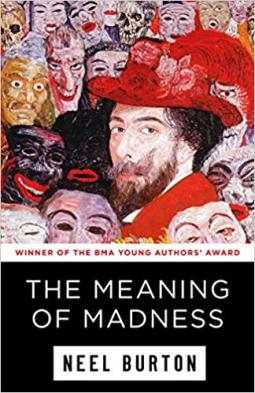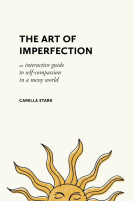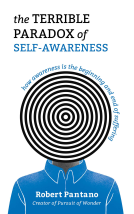
The Meaning of Madness
Ataraxia Book 1
by Neel Burton
This title was previously available on NetGalley and is now archived.
Send NetGalley books directly to your Kindle or Kindle app
1
To read on a Kindle or Kindle app, please add kindle@netgalley.com as an approved email address to receive files in your Amazon account. Click here for step-by-step instructions.
2
Also find your Kindle email address within your Amazon account, and enter it here.
Pub Date Sep 06 2015 | Archive Date Sep 06 2020
Talking about this book? Use #TheMeaningofMadness #NetGalley. More hashtag tips!
Description
This award winning book aims to open up the debate on mental disorders, to get people interested and talking, and to get them thinking.
For example, what is schizophrenia? Why is it so common? Why does it affect human beings but not other animals? What might this tell us about our mind and body, language and creativity, music and religion? What are the boundaries between mental disorder and 'normality'? Is there a relationship between mental disorder and genius?
These are some of the difficult but important questions that this book confronts, with the overarching aim of exploring what mental disorders can teach us about human nature and the human condition.
The Ataraxia book series
The happiness of your life depends upon the quality of your thoughts. —Marcus Aurelius, Roman emperor and stoic philosopher
In my work as a psychiatrist, I help to treat mental disorder—and, I’m delighted to say, most of the people I see do get better.
But why stop here?
I believe that there is much more to mental health than the mere absence of mental disorder.
Mental health is not just about surviving, but about thriving, about developing and expressing our highest, fullest potential as human beings.
Before Christianity, there were, of course, the pagan gods, Zeus and Jupiter and their ilk. But, especially for the high-minded, there were also a number of philosophical schools, the major ones being cynicism, stoicism, skepticism, and epicureanism. Although each with its own outlook and method, all four schools aimed at the attainment of mental tranquillity and mastery, or ataraxia—making them, in my view, much more similar than different.
Ataraxia [Greek, ‘lack of disturbance or trouble’] is also the guiding principle of this series, with each book, like each philosophy, adopting a distinct but complementary approach to peace of mind: exploring the deep origins of our distress in The Meaning of Madness; guarding against the demons of self-deception in Hide and Seek; refining our emotions in Heaven and Hell; regulating our relations with others in For Better For Worse; and, finally, honing our thinking skills in Hypersanity.
Although the series is numbered, each book can happily stand on its own—meaning that you can read just one or all five, and in whichever order you like.
Ataraxia is closely linked with eudaimonia, which is often translated as ‘happiness’ but which is, in fact, a much deeper, fuller, and richer concept, sometimes articulated in terms of flourishing, or living a life that is worthwhile and fulfilling.
The stakes could not be higher.
Advance Praise
A really accessible and thorough approach to a complex and often impenetrable subject.
—British Neuroscience Association
Ultimately, this is a work of contradictions, an undemanding read that could challenge your view of the world.
—Medical Journalists' Association
This remarkable book provides a highly readable and at the same time authoritative account that by combining literary and scientific sources shows the deep connections between madness and some of our most important attributes as human beings.
--Prof Bill Fulford, University of Oxford
Average rating from 5 members
Featured Reviews
'How do you know I'm mad? How do you know you're not mad? '
These, questions form the basis of the discussion of all the main ills tjat afflict so many in the Western world: schizophrenia, bipolar disorder, depression, ADHD, anxiety disorders.
The discussion is always scholarly and provocative. Schizophrenia, it is claimed here, is a uniquely human disease as it attacks the very ability to conceptualise using language. Many highly creative individuals are a little bit bipolar, And so on.
We are also reminded that the criteria for assessing any kind of mental illness is also subjective. It depends on ticking chrckboxes of symptoms, not on taking a blood test or a swab. Mental illness is not like catching the flu. To illustrate the point, there is reference to that experiment were healthy students admitted themselves, just to see what would happen: all behaviour was subsequently labelled as pathological, and it proved difficult to escape the hospital without further help from outside. Once cast in the role of patient, always a patient.
Then there is the troubling recognition that mental illness seems to be almpst exclusively an American, or European disease. In many African countries, it is unheard of. The word 'depression' has similarly, only be become recognised in the Japanese lexicon until récently. Suicide, like depression, also seems to become a trend in the way a fashion might : it gives other people ideas. Beware, emo's!
It can be seen that the arguments set forth by this book firmly place it within the anti-psychiatric camp. Big Pharma and the need to make big profits mean that finding allopathic cures forrntsl illness become big business. It is an imperialistic construct that e slaves souls through stigma and loss of liberties, instead of making any attempt to look at what lies behind the symptoms of distress the patient may I itially present with. Symptoms that may have a lot more to do with the human condition of being thoroughly final and mortal, as the existentialists always recognised. Or a failure to meet the higher needs of the Maslovian pyramid. Or the ability, Frankl style to assign meaning to suffering.
Not all of these ideas are necessarily new, but in countries in the Western world where mental illness is as endemic as it is, the debate behind these ideas had best not be relinquished.
I love how this book explores our understanding of mental illness and the title does not fully do it justice because the author delves into years of history and interventions and culture and how all these shape what we mistakenly call as madness.
I loved more so the bit on Schizophrenia and the reference on Dr, Jekyll and Hyde and how literature also contributed to such a misunderstanding of the state of mind. It s an eye-opener and anyone who reads this will not think of mental illness and disorders the same.
Thanks Netgalley for the eARC.
 catherine h, Reviewer
catherine h, Reviewer
Where was this book when I needed it? It offers neat detailed info on various mental illnesses that a layman can understand. I have dealt with the mentally ill, not only in my own family, but for a very long time now on my job. I't's interesting to read about the various individuals who suffered from mental illness and their treatment. I was surprised Nijinsky suffered from schizophrenia. It's so weird that what we lock people up for in Western society, if actually venerated in more traditional societies.
I've known a few folks in my life who suffer from depression; a couple even succeeded in suicide. I never understood it when I was younger, and still don't entirely.
I have noticed that nothing has really changed in treating mental illness, I'm inclined to agree with Neel Burtons's assessment of treatment. The stigma of mental disorder does need to be erased and it needs to be accepted as part of the human conditon.
It's a pretty straight forward read and insightful, with lots of solid research. It's a short, but intersting read.
Readers who liked this book also liked:
Brian Soonho Yoon
Children's Nonfiction, Crafts & Hobbies
Kyle Thiermann
Biographies & Memoirs, Nonfiction (Adult), Parenting, Families, Relationships
Todd Irwin
Business, Leadership, Finance, Nonfiction (Adult), Professional & Technical
Robert Pantano
Health, Mind & Body, Religion & Spirituality, Self-Help

















